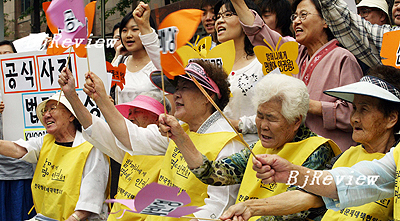
Japan's controversial stance on its activities during World War II recently sparked a new round of international political contention. But this time, the center of the storm is not its Asian neighbors like China and South Korea but the United States, Japan's longtime ally.
The U.S. House Foreign Affairs Committee adopted a resolution on June 26 calling on Japan to formally acknowledge, apologize for and take responsibility for forcing women from countries it occupied into sexual slavery during World War II. The resolution passed by a 39-to-2 vote in the 50-member committee.
The non-binding resolution also demands that Japanese Prime Minister Shinzo Abe issue a public apology and stop all actions within the government that would refute any claims that the atrocities never happened. The measure is expected to go to a full House vote in mid-July.
"The Japanese right-wing forces cannot assert themselves in an unbridled manner on the international stage," said Zhou Yongsheng, a professor and expert of Japanese studies at China Foreign Affairs University. "China and South Korea have reached consensus on the ‘comfort women' issue and now the United States is joining them. The emergence of a shared view among these countries will help rein in the right-wing forces in Japan."
Despite the strong alliance between Washington and Tokyo, American lawmakers are sending a clear warning to Japanese right-wing forces with this resolution, a move that is set to have profound implications for the two countries' relations, Chinese foreign affairs experts said.
The resolution's adoption highlights an "appeal for justice" on the issue in the United States, Zhou said. It is generally believed that the U.S.-Japan alliance is "as firm as iron," but if Japan maintains its controversial stance on the "comfort women" and other historical issues, the United States will change its policy of non-intervention, he added.
In recent years, Japan's whitewashing of the aggression it waged against neighboring Asian nations in World War II not only has strained the country's relations with China and South Korea but also has affected American interests in East Asia, Zhou said.
With Japan's insistence on glossing over its wartime past, Chinese and South Koreans believe that the United States tacitly endorses Japan's right-wing policy-a move that is detrimental to the U.S. image in the region, Zhou added.
"Japan's denial of wartime history is tantamount to a denial of the United States," he said.
Jin Xide, Deputy Director of the Institute of Japanese Studies at the Chinese Academy of Social Sciences (CASS), holds similar views. Since the end of World War II, the United States has been "seemingly neutral" on disputes about historical issues between Japan and the Asian countries it invaded, he said. As a member of the anti-fascist bloc in the war, the United States has long held a permissive attitude about Japan in light of its own strategic interests, he said. But now Washington realizes that as it becomes increasingly isolated in Asia, Tokyo is not able to be an effective ally, he added.
The morality of U.S. policies has come under more intense scrutiny in East Asia, because the United States often interferes in international affairs with its formidable hard and soft power, Jin said. Because of this, its position on "comfort women" and other historical issues concerning Japan's military aggression has become morally untenable in recent years, he said.
Asia's rapid economic rise is another reason why the Americans have started rethinking their policy toward Japan, Jin said. East Asia has become an important part of the world economy and is gradually turning itself into the third most important economic power on par with North America and Western Europe, he added.
As East Asia modernizes, its people are growing more sensitive to public opinion and are intolerant about what they perceive to be the United States' indifferent approach, Jin said. The Americans realize that they will lose their moral high ground if they continue to turn a blind eye to historical issues in East Asia.
"Historical issues will become a new facet of U.S.-Japan relations, which were mainly about economic and security cooperation in the past," Jin said. "The move is bound to have far-reaching implications for future U.S.-Japan relations."
It is believed that the Japanese military forced up to 200,000 women-known as "comfort women"-mainly from China, South Korea and other countries that it occupied during the war to work as sex slaves in Japanese military brothels.
Changing attitude toward Japan's wartime past have been brewing in the United States for the past couple of years. During the second half of 2005, the U.S. media began to criticize Japan for its stance on its wartime aggression and atrocities. Although the U.S. Government did not take sides with the media, it tacitly encouraged reflections on those issues as it came to realize the damage caused by Japan's mishandling of them, Zhou said.
| 